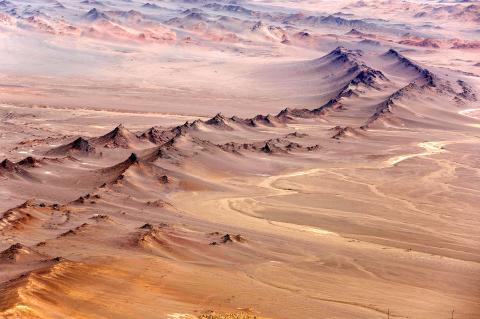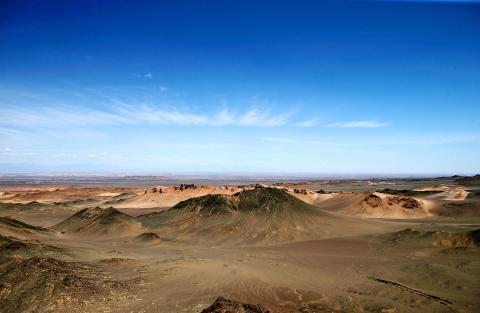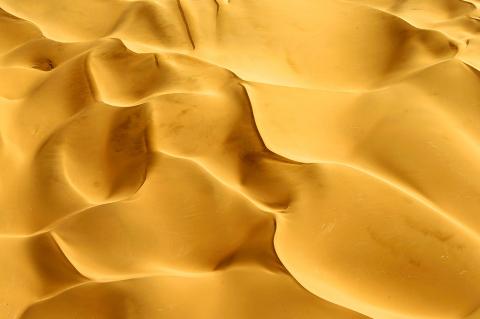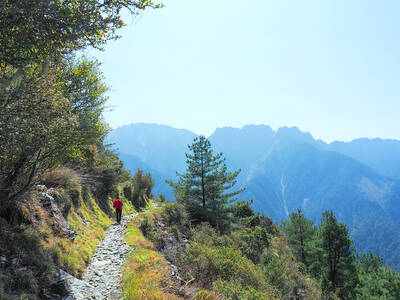The Tengger Desert lies on the southern edge of the massive Gobi Desert, not far from major cities like Beijing. The Tengger is growing.
For years, China’s deserts spread at an annual rate of more than 4,000km2. Many villages have been lost. Climate change and human activities have accelerated the desertification. China says government efforts to relocate residents, plant trees and limit herding have slowed or reversed desert growth in some areas. But the usefulness of those policies is debated by scientists, and deserts are expanding in critical regions.
BIG DESERT GETTING BIGGER

Photo: AFP
Nearly 20 percent of China is desert, and drought across northern China is getting worse. One recent estimate said China had 54,400km2 more desert than what existed in 1975 — about the size of Croatia. As the Tengger expands, it is merging with two other deserts to form a vast sea of sand that could become uninhabitable.
Across northern China, generations of families have made a living herding animals on the edge of the desert. Officials say that along with climate change, overgrazing is contributing to the desert’s growth. But some experiments suggest moderate grazing may actually mitigate the effects of climate change on grasslands, and China’s herder relocation policies could be undermining that.
In an area called Alxa League, the government has relocated about 30,000 people, who are called “ecological migrants,” because of desertification.

Photo: AFP
Officials have given Liu Jiali, 4, and her family a home in a village about 10km from Swan Lake, the oasis where they run a tourist park. To get them to move and sell off their herd of more than 70 sheep, 30 cows and eight camels, the officials have offered an annual subsidy equivalent to US$1,500 for each of her parents and US$1,200 for a grandmother who lives with them.
Jiali’s mother, Du Jinping, 45, said the family would live in the new village in the winter, but return to Swan Lake in the summer.
Local governments in desert regions began relocating people away from the encroaching sands decades ago. But China’s densely populated areas are pushing toward the deserts, as the deserts grow toward the cities.

Photo: AFP
Storms of wind-driven sand have become increasingly frequent and intense, reaching Beijing and other large cities. “We dread the sandstorms,” Du said.
Residents who live on the edge of the deserts try to limit the steady march of the sand. Along with local governments, they plant trees in an effort to block the wind and stabilize the soil.
Many people in this area are from families that fled Minqin, at the western end of the Tengger Desert, during China’s Great Famine from 1958-62, when tens of millions died.
Guo Kaiming, 40, a farmer who also manages a tourist park at the edge of the Tengger Desert, planted rows of trees by a new cross-desert highway in June.
Guo took saplings the government had left behind after it completed a tree planting operation. He said he was not ready to join the climate refugees. He has his corn and wheat fields, plus income from running the tourist park.
Last year, the company that runs the park paid students to build seven giant sand sculptures as its centerpiece. But strong desert winds steadily eroded them.
“They are all a mess now,” Guo said. “The wind is fierce.”
RECLAIMING THE DESERT
The government encourages farmers like Guo because, it says, agriculture can help reclaim land from the desert. Officials offer subsidies: Guo gets US$600 per year for “grassland ecological protection.”
But farming is also becoming more difficult. Huang Chunmei, who grew up in the town of Tonggunao’er and now farms there, said the water table was 2 meters below ground during her childhood, and “now, you have to dig 4 or 5 meters.”
Huang planted more than 200 trees on her own last spring, in the hope that they would help block sandstorms and hold back the sand.
“The soil is not as soft or good as it was before,” she said. “We use more fertilizer now.”
Huang and her husband have sent their 14-year-old daughter to a boarding school in a nearby city.
“I don’t want my girl to return,” she said. “The sand and wind make life tough here.”
About 17 percent of the population in Alxa League are ethnic Mongolians, whose lives and livelihoods have long been tied to the herding the government is trying to halt.
Mengkebuyin, 42, and his wife, Mandula, 41, grow corn and sunflowers, but their 200 sheep provide most of their income: They sell the meat to a hotel restaurant in a nearby city.
The sheep graze in the desert, where grass is growing scarce. They roam near his old family home, near the shores of a lake that dried up years ago. He would like to move to better pasture, but the government will not let him. Mengkebuyin and his wife maintain the old home but do not stay for long periods. They have moved to a village 5 miles away.
Mengkebuyin and Mandula have decided that they want their 16-year-old daughter to live and work in a city.
Four generations of Mengkebuyin’s family lived by the lake in a thriving community. But gradually, everyone left.
The desert has taken over.

June 9 to June 15 A photo of two men riding trendy high-wheel Penny-Farthing bicycles past a Qing Dynasty gate aptly captures the essence of Taipei in 1897 — a newly colonized city on the cusp of great change. The Japanese began making significant modifications to the cityscape in 1899, tearing down Qing-era structures, widening boulevards and installing Western-style infrastructure and buildings. The photographer, Minosuke Imamura, only spent a year in Taiwan as a cartographer for the governor-general’s office, but he left behind a treasure trove of 130 images showing life at the onset of Japanese rule, spanning July 1897 to

In an interview posted online by United Daily News (UDN) on May 26, current Chinese Nationalist Party (KMT) Chairman Eric Chu (朱立倫) was asked about Taichung Mayor Lu Shiow-yen (盧秀燕) replacing him as party chair. Though not yet officially running, by the customs of Taiwan politics, Lu has been signalling she is both running for party chair and to be the party’s 2028 presidential candidate. She told an international media outlet that she was considering a run. She also gave a speech in Keelung on national priorities and foreign affairs. For details, see the May 23 edition of this column,

One of the most important gripes that Taiwanese have about the Democratic Progressive Party (DPP) is that it has failed to deliver concretely on higher wages, housing prices and other bread-and-butter issues. The parallel complaint is that the DPP cares only about glamor issues, such as removing markers of Chinese Nationalist Party (KMT) colonialism by renaming them, or what the KMT codes as “de-Sinification.” Once again, as a critical election looms, the DPP is presenting evidence for that charge. The KMT was quick to jump on the recent proposal of the Ministry of the Interior (MOI) to rename roads that symbolize

Jade Mountain (玉山) — Taiwan’s highest peak — is the ultimate goal for those attempting a through-hike of the Mountains to Sea National Greenway (山海圳國家綠道), and that’s precisely where we’re headed in this final installment of a quartet of articles covering the Greenway. Picking up the trail at the Tsou tribal villages of Dabang and Tefuye, it’s worth stocking up on provisions before setting off, since — aside from the scant offerings available on the mountain’s Dongpu Lodge (東埔山莊) and Paiyun Lodge’s (排雲山莊) meal service — there’s nowhere to get food from here on out. TEFUYE HISTORIC TRAIL The journey recommences with